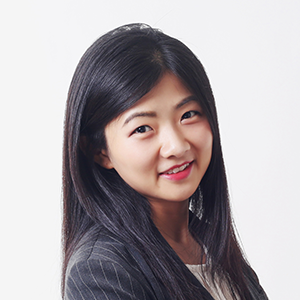2022 Innovator Award Winner
Young Alumnae graduate | Second Place
Wenjun Zhang, PhD’16, MBA’21
Founder, UniWise

Wenjun Zhang’s Saliva-Based Testing Device Could Put an End to Painful Finger Pricks for People with Diabetes
by Molly Callahan | November 10, 2022
As an engineer and entrepreneur, Wenjun Zhang envisions a future where everyone has access to fast, accurate, and real-time healthcare diagnostic testing anywhere, anytime. With her expertise, Zhang’s venture, UniWise, will help her identify societal issues, analyze their root causes, and develop solutions to resolve unmet needs through effective and affordable access to saliva-based diabetes testing.
Wenjun Zhang envisions a future in which blood glucose testing for people with diabetes will be as simple, painless, and familiar as at-home COVID-19 tests have come to be. Thanks to her innovative idea, UniWise, that future might not be far off.
Zhang, who graduated from Northeastern University in 2016 with a doctorate degree in engineering, is developing a device that will be able to detect trace amounts of glucose found in saliva. This would mean the end of painful finger pricks for people with diabetes who need to regularly monitor their body’s glucose levels, she says.
Her innovation stands to help millions of people. The United States Centers for Disease Control and Prevention estimates that 37.3 million people have diabetes in the U.S. alone. An additional 96 million people in the country have prediabetes, a serious health condition in which a person’s blood sugar levels are higher than normal but not high enough to be diagnosed as Type 2 diabetes. Finally, gestational diabetes—which can develop during pregnancy in people who don’t already have diabetes— occurs in 2 to 10 percent of pregnancies each year in the U.S.
The maintenance and diagnostic tests for each of these are slightly different, but all of them require a blood test to measure the level of sugar in a patient’s blood. People with Type 2 diabetes need to test their blood sugar levels throughout the day, a process that requires them to draw a small amount of blood, usually from their fingertips.
Here’s where UniWise would change the game. Zhang’s device utilizes nanosensing technology to measure trace amounts of glucose (sugar) found in a patient’s saliva. This means that people with Type 2 diabetes could simply place the device into their mouths to collect saliva, rather than bruising their fingers.
“As a female myself, I feel like I have this duty to better the health of moms and parents.”
—Wenjun Zhang, Founder, UniWise
“As a female myself, I feel like I have this duty to better the health of moms and parents.”
—Wenjun Zhang, Founder, UniWise
“Saliva,” Zhang says, “is a window to your overall health.”
For her groundbreaking work, Zhang was recognized with a 2022 Innovator Award, a competition hosted by Northeastern’s Women Who Empower that drew more than 100 entries this year.
“I saw a need for a pain-free, noninvasive detection mechanism for Type 2 diabetes,” says Zhang, who studied chemistry and nanomaterials as an undergraduate, and sensing technology during her PhD work at Northeastern.
Beyond her credentials, Zhang says she felt called to help—the maternal and gestational diabetes statistics shocked her into action.
“As a female myself, I feel like I have this duty to better the health of moms and parents,” she says. While Zhang had the science and engineering knowledge to explore the problem, she was less certain at first about designing a solution. For that, she needed business acumen. So, Zhang went back to school and in 2021, earned a Masters in Business Administration from the D’Amore-McKim School of Business at Northeastern.
“Wenjun started out as a great scientist, doing her PhD and then working in labs at Northeastern, but she was always thinking of the market potential and human impact of her research,” says John Friar, executive professor of entrepreneurship at Northeastern, and one of Zhang’s mentors.
Zhang came up with several ideas for technology that could help people with diabetes, Friar says, but had little experience bringing those ideas to the market. “What she did that was exceptional is that she started asking people who had experience in entrepreneurship for their advice—she learned by asking. Eventually, she got her MBA so she has a stronger background in business, but she still is constantly learning through her networks of contacts and is expanding that network constantly.”
UniWise is still in its very earliest stages of development. Zhang holds a patent for the technology, and her team was just beginning to conduct preliminary clinical trials at a hospital in Taiwan when COVID-19 shut the whole thing down. Now, she’s looking for a hospital in the U.S.—hopefully Boston—to partner with for a new round of clinical testing. Zhang is also working with a consultant from the federal Food and Drug Administration to guide her through the regulatory process, she says.
“For me, this is personal,” Zhang says. “I’ve been pushing this project for almost 10 years, but it will all be worth it if this technology can help even one person. Being able to help someone will give me a sense that I did something meaningful with this life.”